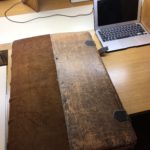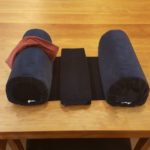Accessing the Archives: Stages and Pitfalls of Reaching Primary Sources
Successfully entering an archive at any stage of your research can be very easy or very terrible. I’ve even heard of people traveling all the way to a distant archive, only to be turned back at the door. Though you cannot control everything in your pursuit of primary sources for a dissertation or a thesis report, failing to reach your dream archive does not have to be one of them.
IV. Touching the Texts
Touch your texts as little as possible. When you do, try to restrict your touching to the top right hand corner, where you will turn the page.
Avoid touching the ink if at all possible, especially with older texts, and never touch illuminations or other types of artistic work.
The Da Vinci Code era of wearing gloves to touch texts is generally over, as it has been found to reduce your fingertip sensitivity and could actually increase the risk of torn pages. A few archives will still give you gloves, which you should use to respect their practices. Many archives will not.
Know your ink and know your print. If you are looking at a medieval book with blue ink, that blue was possibly made by lapis lazuli brought all the way from Afghanistan. Your book was not cheap to make. If your book is printed instead of handwritten, but printed before 1501, you are looking at what is called an “incunable” and it represents the earliest stage of printing press history. The most famous incunable is the Gutenberg Bible.
Make note of both the publisher and their location. If your book is from between 1539 and 1560, for example, and was published in Mexico City, it may have been published using the very first printing press in the “New World.”
Are your book’s images woodcut? Metal engraved? Does the print on the page show signs of uniform smudging or blurring, which could indicate a low quality or “quick” print job? All of these elements are important to take note of, as they can reveal the target audience of the text and the speed of publication.
Another important aspect is the care that is put into the books themselves as physical objects. Depending on the fragility of your texts and the wear on the spine, your texts may be brought out to you in “cradles” or “futons,” which gently hold the book in place. Avoid lifting books out of their cradle if they are still open. Use a “snake,” a special bean-filled bookmark, to hold your pages open.
If the book will not open all the way or if old pages crackle, do not open them fully. You will have to gather what information you can from the book in its partially opened state. If you force the book open or force the page to turn, you might damage it. As taking care of the texts is of paramount importance to your archive, be sure to inform the archivist if you notice anything odd or fresh—especially if that odd thing is an insect!
And lastly, the Harry Ransom Center at UT is an amazing example of an archive with many fragile and rare texts. If you want to practice using cradles, snakes, and turning the page before you go, requesting a book from the Harry Ransom Center and undergoing their training module will give you excellent preparation before you hop on the plane. The link is here: https://www.hrc.utexas.edu/research/info/.


The information here will get your well on your way when it comes to handling an archives works. That being said, it is always important to read up on specific policies and to listen to the archivist working with you, so that you know the correct protocol in every situation. When it doubt about something, it never hurts to ask!
Acknowledgements
Archives that have contributed to the sum of my experiences include the Harry Ransom Center at the University of Texas at Austin, the Archivo Capitular of the Cathedral of Toledo, the Widener Library at Harvard, the Newberry Library in Chicago, the Biblioteca Nacional de España in Madrid, the Benson Library at the University of Texas, the Fisher Rare Book Library at the University of Toronto, and the Archivo General de las Indias in Seville.
